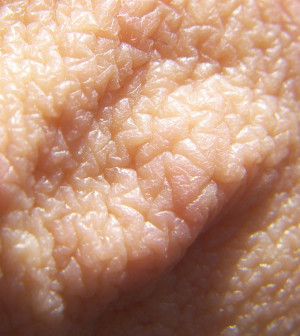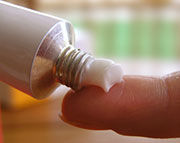- Stigma, Shame Hit Many Gay Men Affected by Mpox Outbreak
- Calories, Not Meal Timing, Key to Weight Loss: Study
- Dietary Changes May Beat Meds in Treating IBS
- Screen Pregnant Women for Syphilis, Ob-Gyn Group Advises
- Even With Weight Gain, Quitting Smoking in Pregnancy Still Best for Health
- A-Fib Is Strong Precursor to Heart Failure
- One Neurological Factor Keeps Black, Hispanic Patients From Alzheimer’s Clinical Trials
- Managing Blood Sugar After Stroke Could Be Key to Outcomes
- Dozens of COVID Virus Mutations Arose in Man With Longest Known Case
- Blood Test Might Someday Diagnose Early MS
Use of Low-Dose Steroid Creams During Pregnancy Won’t Affect Baby: Study


WEDNESDAY, Sept. 4Women who apply prescription steroid creams such as cortisone to ease a medical issue during pregnancy should not worry that the medication will affect their baby, a new study finds.
“Cortisone [creams] can be a very powerful drug for a pregnant woman suffering from a variety of conditions both related and unrelated to pregnancy,” noted one expert, Dr. Doris Day, a dermatologist at Lenox Hill Hospital in New York City.
“In many cases, there are no substitutes that will relieve the itch and suffering of the conditions, which without proper treatment with cortisone are not only miserable to tolerate but can also lead to permanent scarring,” said Day, who was not connected to the new study.
Reassuringly, the researchers found that use of corticosteroid gels or creams during pregnancy is not linked to an increased risk for certain complications, including premature delivery, cleft lips or palates and fetal death.
The Taiwanese team also found use of these steroid lotions also does not change the method of delivery or affect a baby’s “Apgar scores” — standard test results given to infants right after birth to rate their breathing, muscle tone, color, heart rate and reflexes.
The study, conducted by Dr. Ching-Chi Chi, of the Chang Gung University College of Medicine, involved almost 2,700 pregnant women who used corticosteroids creams as well as more than 7,200 pregnant women were not exposed to this medication.
Although there was no link between use of corticosteroids and pregnancy outcomes, the study, published Sept. 4 in the journal JAMA Dermatology, showed that women who used potent or very potent forms of this medication — more than 300 grams during their entire pregnancy — were at greater risk for low birth weight babies.
Another expert called the study “incredibly relevant” for dermatologists and their patients.
“Inflammatory dermatoses such as atopic dermatitis and psoriasis are often optimally controlled with topical [cream] corticosteroids,” explained Dr. Chris Adigun, an assistant professor in the department of dermatology at NYU School of Medicine, New York City. “These inflammatory dermatoses can be unpredictable in their behavior during pregnancy. For some women, they actually improve during pregnancy, but for others, their conditions are worse during pregnancy.”
Adigun added that many women may take pills to help ease their skin symptoms, but during a pregnancy these may pose more risk to the fetus than a medicinal cream, so creams are often preferred.
The finding that steroid creams given at a high dose may have some link to an increased risk of low birth weight is especially important, he said.
“My recommendations based on the conclusions of this study would be to prescribe mild to moderate topical corticosteroids in general if they are indicated, but for severe disease, prescribe very limited quantities of potent topical corticosteroids with very close follow-up [1-2 weeks after dispensed prescription], to assess exposure, application and use,” Adigun said.
More information
The American Academy of Family Physicians provides more information on steroid creams.
Source: HealthDay
Copyright © 2024 HealthDay. All rights reserved.










